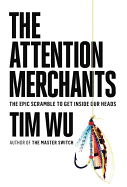
Where do you draw the line between your private life and the world of commerce and public opinion? Do you draw it at all? Tim Wu (The Master Switch) is an influential law professor and policy advocate known for coining the term "net neutrality." His goal in The Attention Merchants is to make us aware of "the influence of economic ambition and power on how we experience our lives."
Wu begins with certain school districts that have welcomed corporate advertisers into their classrooms. The worst of this, says Wu, "is just how uncontroversial and indeed logical it has seemed to those involved." We have gradually given up on the idea of sacrosanct private spaces free of commercial and political exploitation. Wu asserts that this change is not a natural evolution but the direct result of "the dramatic and impressive rise of an industry that barely existed a century ago."
This is a well-paced and lively history of how advertising and propaganda started with posters and patent medicines before soon becoming "an increasingly efficient engine for converting attention into revenue." Wu also examines the neuroscience of attention and distraction, and how easy it is to exploit them. But he emphasizes that the most important question is "not how the attention merchant should conduct business but where and when." This can be legislated, but important changes may be made in our daily decisions about where we choose to look. --Sara Catterall

